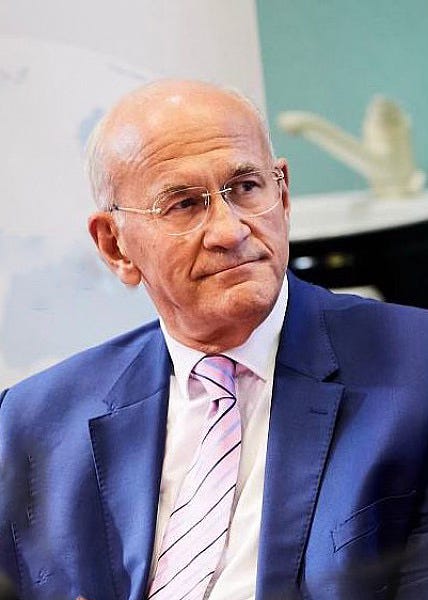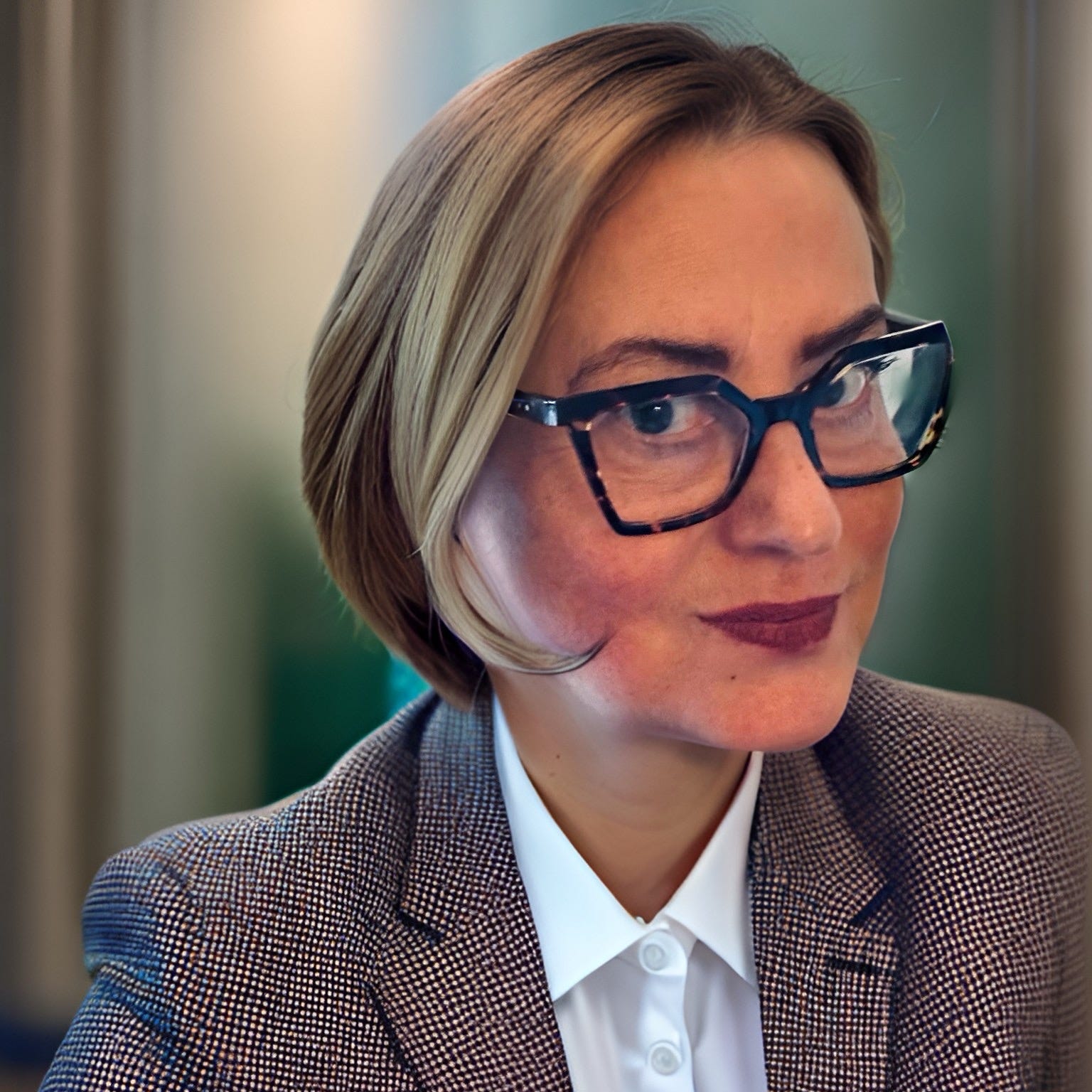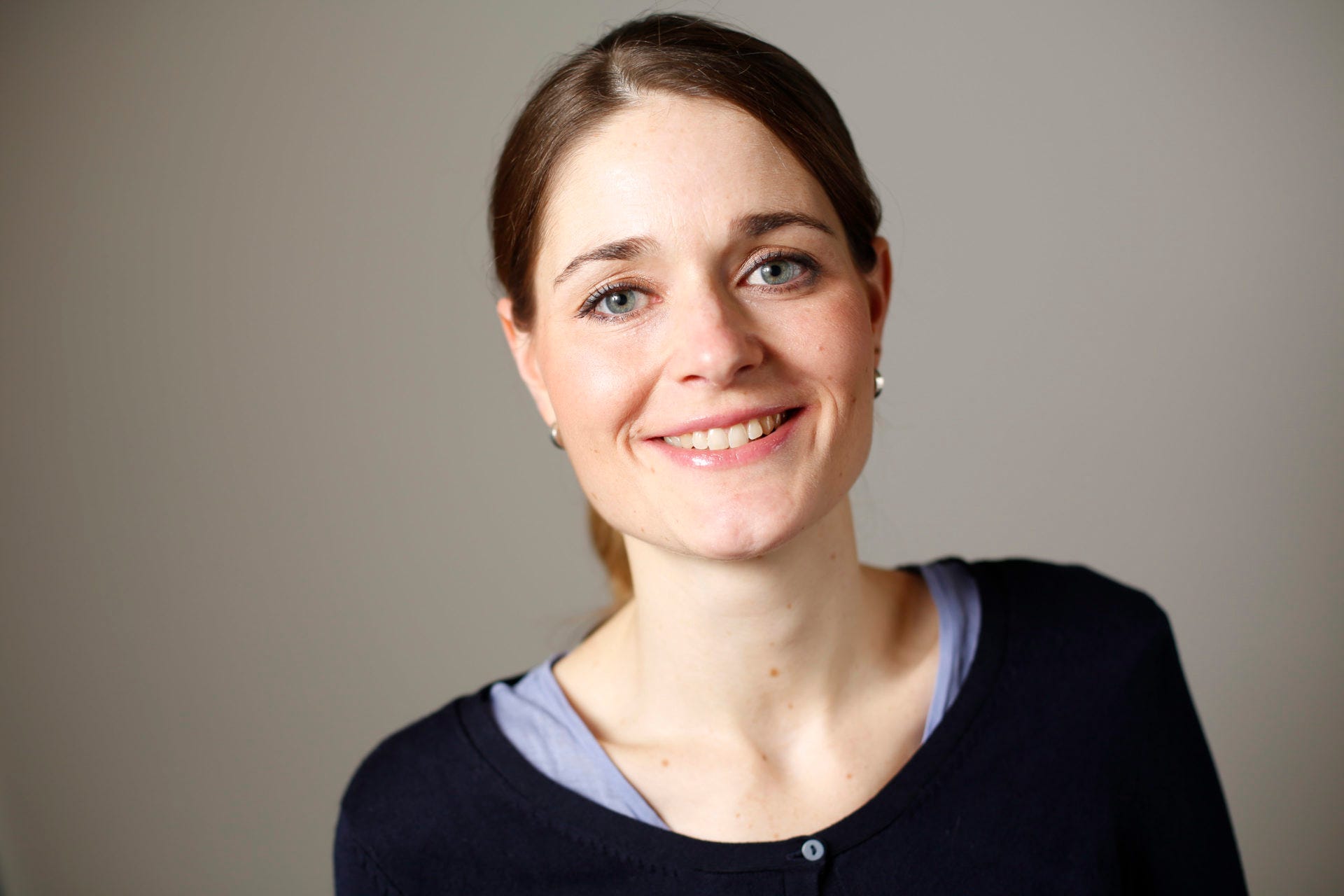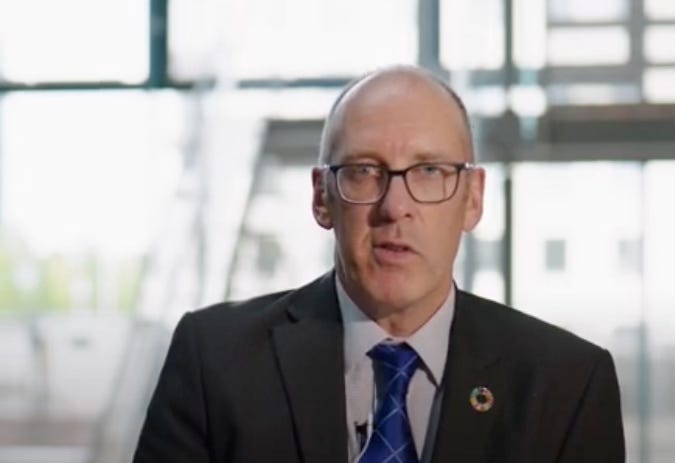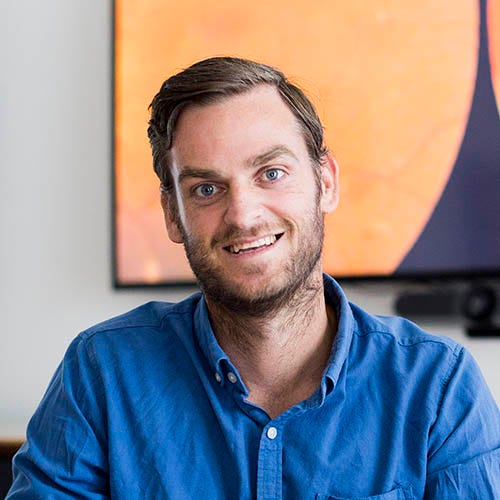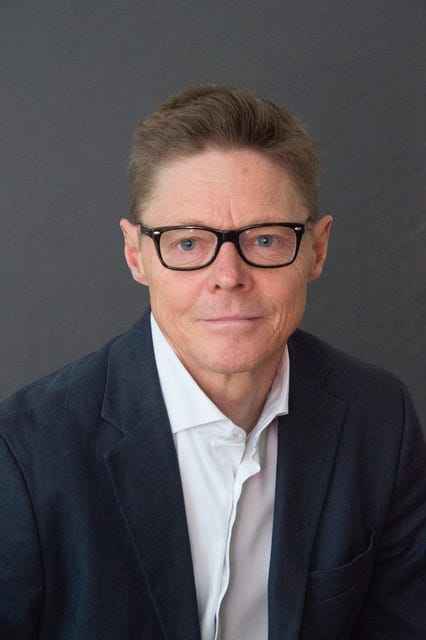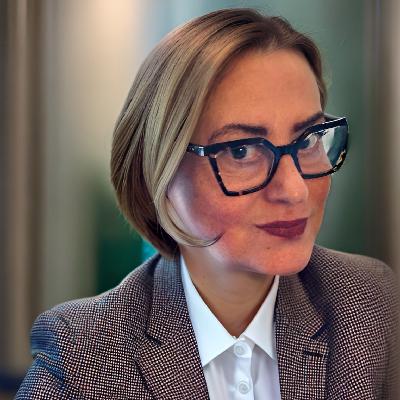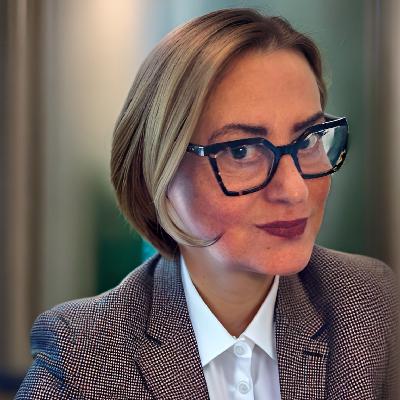Discover The Brief
The Brief

The Brief
Author: Maya Plentz
Subscribed: 0Played: 0Subscribe
Share
© Maya Plentz
Description
Hear first hand from the diplomats, tech executives, investors, UN and EU officials that are changing the world through dialogue and are using emerging technologies for good.
theunbrief.substack.com
theunbrief.substack.com
18 Episodes
Reverse
*This interview was recorded in December 2025. The United Nations marked its 80th anniversary in 2025, and few people can comment on the institution’s memory, and quiet achievements, as well as Dr. David A. Chikvaidze.Over more than three decades of service—from New York to Geneva, from human rights crises to high-level diplomacy—he has advised four Directors-General of UN Geneva, helped senior managers steer the UN through political turbulence, and witnessed the evolution of multilateralism from the inside.For this edition of THE BRIEF, I sat down with Dr. Chikvaidze to reflect on the UN’s legacy at a moment of deep global uncertainty. What has the UN truly accomplished over eight decades, and where has it failed to live up to its promise? Can an institution born in 1945 remain credible in an era defined by AI, cyber conflict, pandemics, and geopolitical fragmentation? And what reforms are genuinely within reach?Drawing on his experience across the UN system—from the UN Human Rights Agency (OHCHR), to politically sensitive field missions—Dr. Chikvaidze offers candid insights into the future of human rights, humanitarian action, crisis diplomacy, and the leadership qualities needed to navigate today’s multilateral landscape.Dr. Chikvaidze has worked at the heart of the UN system—as a senior adviser, political troubleshooter, and Chef de Cabinet to four Directors-General of the United Nations Office at Geneva. His career spans politically sensitive missions, human rights diplomacy, and the quiet, often unseen work that keeps multilateralism functioning.Chikvaidze says that the UN’s greatest achievement remains its endurance as a forum for dialogue. He argues that procedural reform and political will must advance together if credibility is to be restored.Geneva, he emphasizes, remains central to this effort.As a hub for human rights, humanitarian action, trade, disarmament and health diplomacy, UN Geneva represents what multilateralism looks like when it functions pragmatically—often away from headlines, but with tangible global impact.On reform, Chikvaidze cautions against unrealistic expectations. Structural change, particularly to the Security Council, will be incremental at best.What is immediately achievable, he argues, is cultural reform: strengthening leadership accountability, protecting the independence of UN expertise, and reinforcing respect for international law.His reflections on human rights are particularly sobering.Having worked within OHCHR during periods of intense political pressure, Chikvaidze warns that polarization risks hollowing out the normative foundations of the system.Still, he remains cautiously optimistic, pointing to a new generation of diplomats and international civil servants who are more globally minded, technologically literate, and ethically driven.“The UN’s future,” he concludes, “will depend less on grand declarations than on whether Member States are willing to let the institution do the job they created it to do.”Listen:THE BRIEF is read by diplomats, academics, and editors of international affairs news publications all over the world. To support our work, consider becoming a paid subscriber.THE BRIEF counts on your support to keep our independent coverage of the United Nations, diplomacy, and global tech policy governance.We are launching our first major membership drive — and are offering a 50% lifetime discount for new paid subscribers.Get 50% off forever here.Why This Moment MattersWhen I started covering the United Nations in New York, in the early 2000s, the UN was at the center of a polarizing global debate. The Iraq War, Kofi Annan’s principled leadership, and the ill-informed criticism from far-right think tanks and media outlets made thoughtful UN reporting essential.I felt the absence of nuanced, informed coverage of multilateralism.I built my career in the UN ecosystem — first reporting from inside the UN, as a reporter, website editor, and broadcast news presenter and producer at the News & Media Division of the UN Department of Public Information, under the leadership of Shashi Tharoor, who was Kofi Annan’s Under-Secretary-General for Communication and Public Information.Later, when advising European Commissioner Carlos Moedas on financing research and innovation through the European Union’s Horizon 2020 and the Horizon Europe Framework Programme for Research and Innovation, to create a favorable environment for European tech unicorns to thrive, I stressed the importance of supporting reliable, credible, factual news outlets to make science news — and commercial applications of research — available to the general public.Now covering Geneva diplomacy, and building THE BRIEF as a platform that champions facts, context, and the value of international cooperation, I hope to inform diplomats posted around the world, including Geneva, Paris, London, and New York, as well as UN officials spread throughout the globe, on the burning issues of economic development policy, in particular tech policy, as it is so pervasive to our lives.Today, much like 20 years ago, the UN and the multilateral system face unprecedented pressure — political, financial, and structural. But there is even less independent media explaining what is actually happening inside these institutions.THE BRIEF fills that gap. But to keep doing it, we need your support.Why Become a Paid Subscriber?If you’ve followed THE BRIEF, you know our mission:* Report what others overlookTech governance at UNESCO, WTO digital negotiations, AI regulation, cybersecurity diplomacy, humanitarian innovation — these stories rarely make mainstream headlines.* Explain global governance in a clear, accessible wayNot institutional PR, but real analysis, interviews, and on-the-ground reporting.* Give voice to diplomats, UN staff, policy experts, and innovatorsThe people who quietly shape international rules that affect everyone.* Highlight the intersection of technology, regulation, and geopoliticsA rapidly growing space desperately in need of serious journalism.Why Now?Our funding environment has shifted. At the same time, the demand for reliable coverage has never been higher.Geneva, Paris, London, Brussels, and New York are overflowing with critical decisions on AI governance, trade, digital policy, and humanitarian reform that will shape the next decade. THE BRIEF is one of the very few outlets following these stories closely.To keep producing original interviews, on-site coverage from UN agencies, diplomatic analysis, explainer series on treaties and negotiations, and our expanding video and podcast formats, I’m asking for your support.Get 50% off foreverWhat You’ll Get as a Paid Subscriber* In-depth analysis of UN, WTO, UNESCO, and diplomatic developments* Interviews with ambassadors, UN leaders, and tech policy experts* Special series from UN HQs in Geneva, Paris, and New York* Priority access to Q&As, event invitations, and briefings* Early access to THE BRIEF’s documentary, podcast, and video interviews* A real community of people who care about global governance and factsIn other words:You’re not just supporting journalism — you’re strengthening multilateralism at a time when it is under attack.If THE BRIEF has ever helped you:* understand a complex UN process* discover the personalities shaping foreign policy* prepare for a multi-stakeholder meeting* follow a treaty negotiation* understand what the UN agencies do* the stakes for implementation of UN reform* learn something about the history of diplomacy* or simply stay connected to the world of diplomacy and global affairs…then please consider becoming a paid subscriber today.Get 50% off foreverYour support — at any level — makes a direct difference in sustaining the only independent, Geneva-based publication dedicated to UN & tech governance reporting.Thank you for being part of this community.Together, we can strengthen informed global dialogue — when it’s needed most.Maya PlentzFounder and Editor-in-Chief, THE BRIEFWe cover UN offices and conferences with our partners and correspondents in:Geneva | Paris | New York | London | Vienna | Nairobi | Copenhagen | Dakar | Bonn This is a public episode. If you'd like to discuss this with other subscribers or get access to bonus episodes, visit theunbrief.substack.com/subscribe
So far, in the UN website, only his credentials are posted, the other contenders are Michelle Bachelet, former president of Chile and former head of the UN Human Rights agency, and Rebeca Grynspan, the current head of UNCTAD.How do they compare?Rafael Mariano GrossiRafael Mariano Grossi is an internationally recognised leader of multilateral organisations, with more than four decades of senior-level experience in international governance, diplomacy, and institutional management. He currently serves as Director General of the International Atomic Energy Agency (IAEA), the United Nations body responsible for preventing the proliferation of nuclear weapons while advancing the peaceful uses of nuclear science and technology in support of international peace, security, and sustainable development.Since his unanimous appointment as Director General in 2019, and his re-election in 2024, Mr. Grossi has led the IAEA through a period of unprecedented geopolitical tension and institutional demand. Under his leadership, the Agency has strengthened its credibility as an impartial, technically authoritative, and operationally effective international organisation, capable of delivering results even in highly polarised environments. He has consistently exercised his good offices to facilitate dialogue and reduce risk in situations of international tension across Europe, the Middle East, and Asia, reinforcing the IAEA’s role as a trusted broker within the multilateral system.Mr. Grossi’s tenure has been marked by a strong emphasis on institutional integrity, evidence-based decision-making, and consensus-building among Member States. He has played a central role in sustaining nuclear safeguards and transparency under increasingly challenging conditions, at a time of mounting pressure on the global non-proliferation regime. His leadership style combines diplomatic judgement with operational clarity, enabling the Agency to remain effective while preserving its neutrality and technical authority.Beyond peace and security, Mr. Grossi has positioned the IAEA as a key development-oriented organisation within the UN system. He has spearheaded the launch of flagship initiatives that demonstrate how multilateral institutions can deliver concrete impact aligned with national priorities. These include Atoms4Food to support food security and agriculture; Rays of Hope and ZODIAC to expand cancer care and strengthen preparedness against zoonotic diseases; NUTEC Plastics to address plastic pollution; and Atoms for Net Zero to support clean energy transitions. Together, these initiatives have reinforced the Agency’s role at the intersection of science, development, and public policy.A defining feature of Mr. Grossi’s leadership has been his ability to modernise and expand an international organisation’s reach without increasing its regular budget. By strengthening partnerships and forging innovative cooperation with International Financial Institutions—including landmark agreements with the World Bank and regional development banks—he has diversified funding sources and mobilised additional resources for peaceful nuclear applications. This approach reflects a disciplined commitment to financial prudence, efficiency, and results-driven multilateralism.Mr. Grossi has also demonstrated sustained leadership in institutional culture and talent management. Under his direction, the IAEA achieved full gender parity at the professional level, increasing the representation of women from 29 per cent to 50 per cent within five years. He established flagship programmes to strengthen women’s participation in science and international organisations, including the Marie Skłodowska-Curie Fellowship Programme and the Lise Meitner Programme. His efforts in this area have been internationally recognised, including through the 2025 Changemaker Award from Women in Nuclear. He is an International Gender Champion.Prior to leading the IAEA, Mr. Grossi held senior leadership roles across key international organisations. He served as Chief of Cabinet at the Organisation for the Prohibition of Chemical Weapons (OPCW), Assistant Director General for Policy and Chief of Cabinet at the IAEA, and Ambassador of Argentina to Austria, Slovenia and Slovakia, as well as Representative to Vienna-based international organisations, including UNODC, UNIDO and the CTBTO. He also presided over major multilateral processes, including the Nuclear Suppliers Group and the Diplomatic Conference of the Convention on Nuclear Safety, where he secured unanimous adoption of the Vienna Declaration on Nuclear Safety.Mr. Grossi holds a PhD and a Master’s degree in International Relations, International History and Politics from the Graduate Institute of International and Development Studies in Geneva. He speaks seven languages and has received numerous international honours in recognition of his contributions to multilateral cooperation, international peace, nuclear safety, and institutional leadership.Throughout his career, Rafael Mariano Grossi has demonstrated the capacity to lead complex international organisations with credibility, independence, and effectiveness—strengthening multilateral institutions so they can deliver tangible results in service of peace, security, and sustainable development.PS.: Video excerpt is from his statement, a few months ago, on his visit to Iran to discuss issues of great political sensitivity with Iranian government officials.So far, in the UN website, only his credentials are posted, the other contenders are Michelle Bachelet, former president of Chile and former head of the UN Human Rights agency, and Rebeca Grynspan, the current head of UNCTAD.How do they compare?Here is an analysis of Rafael Mariano Grossi’s vision statement in comparison with other known (publicly reported) priorities of significant 2026 UN Secretary-General contenders such as Michelle Bachelet and Rebeca Grynspan.Context: Under the 2026 UN Secretary-General selection process, candidates are expected to publish a vision statement outlining how they would lead the United Nations; this is a requirement reflected in recent reforms to the selection process. (United Nations)I. Core Themes in Grossi’s Vision StatementGrossi foregrounds renewal, results, and pragmatism:1. UN at an Inflection Point / Renewal* He frames the UN as relevant but ineffective without reform, stressing operational credibility over rhetoric.* Calls for a results-oriented, impartial, fact-based UN, not mere declarations.* Emphasises UN80 initiatives as a foundation for transformation. (United Nations)2. Peace and Security* Grossi places effective action for peace and security as the top priority, urging early, evidence-based diplomatic engagement and impartial expertise.* He especially underscores the Secretary-General’s role in coordinating with the Security Council and Member States with clarity and prudence. (United Nations)3. Development through Partnerships and Realism* Recognises the SDGs are off-track and advocates for grounded, sectoral approaches, measurable progress, and partnerships with civil society, private sector, and science communities.* Encourages stronger engagement with international financial institutions for coherent development support.* Prioritises tangible access to basic public goods (health, food, water, energy, education) rather than abstract goals. (United Nations)4. Human Rights and Dignity* Frames human rights as foundational to peace and development, insisting on effective mechanisms that go beyond declarations, with a focus on women’s rights, youth participation, and civic space. (United Nations)5. Institutional Reform and Management* Emphasises performance-driven renewal, eliminating duplication, improved coordination, digitization, and aligning structure with Member State priorities.* Calls for rightsizing the organization based on mission and resources, not bureaucracy. (United Nations)6. Principled, Pragmatic Multilateralism* Grossi’s overarching narrative is that the UN must be credible, impartial, engaged, and effective, with leadership that listens, acts decisively, and delivers results grounded in core Charter values. (United Nations)Summary of Grossi’s Vision Tone & PositioningHis statement is administratively and operationally focused. It prioritises pragmatism, measurable outcomes, institutional coherence, peace and security, development effectiveness, and institutional credibility grounded in fact-based action rather than ideological framing. (United Nations)II. Comparisons with Other Major Contenders (Publicly Reported Positions)At present, full published vision statements for other declared or nominated candidates are not widely available online (unlike Grossi’s). However, based on publicly reported speeches, campaign coverage, and reported priorities, we can highlight key contrasts and emphases:1. Michelle Bachelet (Chile)While a formal vision statement text is not yet publicly available, Chile’s nomination and Bachelet’s public remarks highlight the following priorities:A. Gender and Representation* Her campaign is strongly associated with breaking the 80-year absence of a woman Secretary-General, underscoring gender equality as integral to legitimacy and leadership. (UPI)B. Human Rights and Inclusive Multilateralism* Her background as UN High Commissioner for Human Rights implies a leadership focus on human rights, inclusion, equality, and democratic norms. This theme pervades her public presence. (Idea)C. Values-Driven Leadership* Bachelet’s narrative is likely to emphasise values, inclusivity, and diplomacy that bridges North–South and East–West divides — building collective solutions. (PassBlue)Contrast with Grossi* Grossi is more institutional and operational in tone, focusing on efficiency and measurable outcomes.* Bachelet (based on public campaign framing) is associated with normative leadership, equality, and human rights as central pillars of multilateral effective
In this editionIan Richards on Digital Government This is a public episode. If you'd like to discuss this with other subscribers or get access to bonus episodes, visit theunbrief.substack.com/subscribe
UNICEF and Microsoft Partner-upThe UN Brief interviewed Mac Glovinsky to speak about the Learning Passport, a partnership with Microsoft and Cambridge University to accelerate onboarding of children and adolescents in the digital economy, through educational tools.Glovinsky is the Principal Global Program Manager of the Learning Passport, and is based at the UN headquarters in New York. The Learning Passport is an educational tool that allows for learning on-and-offline. They have rolled-out at post-conflict areas, and in developing countries, helping children to continue their education and allowing them to carry their curriculum wherever they are, as they will eventually move out of refugee camps and thanks to these tools will be able to continue their studies at the appropriate grade level.These are one of the many ways that new technologies are supporting the continuity of education in what are very trying situations for these children and their families.We cover emerging technologies and how they impact international cooperation. Subscribe to The UN Brief for exclusive interviews with UN officials, diplomats, business leaders and academics for insights in the digital transformation of multilateral organizations, and the emerging technologies that are impacting international cooperation.Subscribers have:1. Early access to exclusive content, videos and podcasts, with insights and analysis of current affairs topics.2. Invitation to talks (virtual now) with the key players in Foreign Policy and Tech.3. Participation in round-tables on the future of multilateralism.4. A monthly update, closed to members-only, video call to discuss trends with diplomats, academics, government, and tech leaders.And much more to come in the coming months. Stay tuned. Looking forward to interacting with you all,Maya PlentzEditor in ChiefSubscribe to our newsletter This is a public episode. If you'd like to discuss this with other subscribers or get access to bonus episodes, visit theunbrief.substack.com/subscribe
On this edition:* A weekend in Bourgogne.* Discover the history of Cremant de Bourgogne.* Sustainability in wine production. THE BRIEF is a reader-supported publication. To receive new posts and support my work, consider becoming a paid subscriber.Bourgogne in the SpotlightPondering what to do during the sweltering days of Summer in Geneva? No vacation time left? I suggest you go visit Bourgogne and discover its many food and wine offers. It is paradise for very affordable high-quality wines to wines for special occasions and to, above all, educating your senses.Did you know that Bourgogne wines that can be kept for several years are also a good investment? As an asset class Burgundy wines beat some traditional categories, not to say the investment in pleasure, as the British wine critic Steven Spurrier used to say. “Fine wine is also an investment in pleasure.”We had the pleasure of visiting three wine producers from the region last month.Keep your eyes pricked for the stories and interviews with the winemakers that are representing the best of sustainability and quality from the region at a global scale.Wines from Bourgogne are becoming better known in Brazil, this past month the BIVB, the Bureau Interprofessionel des Vins de Bourgogne, visited Brazil for the first time.Their latest research shows growing exports to the region, in fine restaurants, and by the recommendations of experts in gastronomy. Pairing the delightful Cremant de Bourgogne with Brazilian exquisite seafood and prime-cut barbecues is becoming a thing, with importers realizing the price/quality value and its potential with consumers and restaurateurs alike.In a country where prosecco and champagne reign supreme, given its tropical weather, as a refreshing, celebratory drink, and increasingly in cocktails by renowned bartenders at the Copacabana Palace and Fasano’s (the French architect Philippe Starck designed luxury hotel) Cremant de Bourgogne has already a market in Brazil expecting bubbly happiness drinks, that just needs to be developed to gain market share.One of our visits was to the Maison Louis Picamelot.We interviewed Louis Picamelot’s grandson, now producer and CEO of the Maison, Philippe Chautard. This is a public episode. If you'd like to discuss this with other subscribers or get access to bonus episodes, visit theunbrief.substack.com/subscribe
Subscribe for news on the UN and international organisations, and how emerging tech is changing the paradigms. This is a public episode. If you'd like to discuss this with other subscribers or get access to bonus episodes, visit theunbrief.substack.com/subscribe
Presented by EVO Fitness GenevaGet THE BRIEF special May offer with promo code 9NY Sign up here.7-Day Free Trial – No Commitment & No Joining FeeFind out more about EVO Fitness philosophy.A great place to work out, open 7 days from 6 AM to 11 PM.UN Ministerial Reaffirms Multilateral Commitment Amid Global FractureThe 2025 United Nations Peacekeeping Ministerial, held in Berlin from 13–14 May, convened by the German government and attended by representatives from over 130 UN Member States and partner organizations.Peacekeeping missions, once symbols of collective resolve, now operate under increasingly constrained mandates, diminished legitimacy in host countries, and growing exposure to asymmetric threats.Germany pledged €82 million in new commitments while encouraging others to match ambition with substance. “We want to tailor future missions to the exact needs of the host countries and increase their acceptance and effectiveness,” said Johann Wadephul, Germany’s Foreign Minister, echoing what has become a leitmotif in Western diplomatic discourse: local ownership, global partnership.Defense Minister Boris Pistorius emphasized innovation, announcing German investment in renewable energy for field operations, medical drones, and counter-IED technologies. While 74 countries made formal pledges—including 88 military and police units and support for women, peace and security initiatives—the subtext of the conference revealed fissures in political will and coherence. The geographic and political diversity of the pledging states obscures the uneven distribution of actual deployment. It is countries from the Global South—Bangladesh, Rwanda, Nepal—that continue to provide the bulk of troops, while the industrialized North often positions itself as financier and advisor.Meanwhile, the thematic emphasis on technological modernization and “data-driven peacekeeping” betrays an uncomfortable truth: the impulse to technocratize peacekeeping may be a response to deeper political paralysis. Rather than confront the structural drivers of conflict—economic inequality, climate displacement, neocolonial resource extraction—the international community risks outsourcing peace to algorithms and AI-powered surveillance.Berlin was also a staging ground for long-standing, unresolved debates: How to reform command structures to avoid past failures in Mali, the DRC, and South Sudan? How to ensure accountability in cases of abuse by peacekeepers? How to harmonize competing interests within the Security Council? Eleven states pledged action on accountability and conduct, including support for victims of sexual exploitation, but mechanisms for independent oversight remain weak.Furthermore, the commitments to “strategic communications” and countering disinformation reflect a growing awareness that peacekeeping missions are not merely military deployments but contested narratives in the information sphere. Yet the risk remains that this concern for “information integrity” may prioritize reputation management over transparency and local engagement.The Berlin Ministerial was laden with symbolism: it coincided with the 80th anniversary of the United Nations and the 10-year mark since the 2015 Leaders’ Summit on Peacekeeping. But anniversaries can conceal as much as they reveal. Today, over 61,000 military and police peacekeepers are deployed across 11 missions—often in settings where the UN is simultaneously viewed as indispensable and insufficient.Whether the Berlin pledges mark a renaissance or merely a rhetorical reaffirmation depends not on declarations made in conference halls, but on the lived realities in places like Abyei, Beni, or Gao. Peacekeeping, once imagined as the moral arm of a rules-based order, now treads a narrow path between relevance and retreat.The next chapter, as always, will be written in the field. And for that, political courage—not just strategic planning—remains in shortest supply.Cabo Verde at a Crossroads: Resilient Recovery or Structural Dependence?A small island developing state in the Atlantic with fewer than half a million inhabitants, Cabo Verde has long stood as a symbol of political stability and democratic governance in West Africa. Yet behind its pro-democracy credentials lies a fragile economy dependent on tourism, remittances, and a narrow export base. The latest Trade Policy Review by the World Trade Organization (WTO) offers a glimpse into the country’s mixed progress—a cautious recovery on the surface, with deeper structural dependencies beneath.After suffering a dramatic 20.8% contraction in GDP in 2020, Cabo Verde posted an impressive 15.8% rebound in 2022, stabilizing at 5.5% in 2023. Much of this recovery is credited to the revival of international tourism, which alone brought in over USD 468 million in 2023. Remittances—constituting nearly 11% of GDP—further buoyed domestic demand.However, these gains are precarious. The country’s trade-to-GDP ratio, a telling indicator of openness and vulnerability, peaked above 105% before the pandemic, only to drop to 75% and gradually recover to 95% by 2023. The merchandise trade deficit remains steep: USD 1.76 billion in imports against just USD 383 million in exports. More than 80% of the country’s food is imported.A Narrow Base: Tourism, Re-Exports, and FishThe backbone of Cabo Verde’s economy is services, particularly tourism and transport. Strategic geography has also turned the archipelago into a logistical hub for re-exports—especially fuels and vehicles. Exports of mineral products (largely re-exports of fuels) accounted for 61% of all merchandise trade in 2023. Meanwhile, processed seafood, mostly tuna, now makes up over 84% of domestically produced exports, highlighting the country’s limited industrial and agricultural capacity.Despite repeated calls for export diversification, Cabo Verde’s export concentration index remains four times the global average, exposing it to significant external shocks.Structural Bottlenecks and Bureaucratic DragTrade facilitation has improved on paper: a foreign trade portal launched in 2023, customs costs have decreased, and legislative transparency has advanced. Still, businesses face lengthy customs clearance (averaging over six days in Praia), high import compliance costs (19% of goods value), and complex licensing systems that deter small traders.The absence of an Authorized Economic Operator (AEO) scheme, persistent tariff inconsistencies with WTO commitments, and cumbersome tax exemptions only deepen inefficiencies. Almost a third of surveyed firms cite customs procedures as a severe constraint—well above African and global averages.An Unequal and Concentrated EconomyWomen remain clustered in low-tech sectors with limited access to credit and trade networks, despite a 2019 parity law. Market monopolies continue to plague key sectors: one tour operator dominates the industry, and domestic flights are held by a single carrier. A newly created competition authority in 2022 has yet to dismantle these entrenched positions.State-owned enterprises remain prominent, accounting for over 17% of GDP in revenue—but also dragging public finances, with the three largest SOEs posting losses equal to a quarter of GDP in 2021.The Illusion of OpennessCabo Verde is a signatory to both the African Continental Free Trade Area (AfCFTA) and several WTO agreements, including the Fisheries Subsidies Agreement (2024). It also enjoys preferential market access to the EU (GSP+) and the U.S. (AGOA). Yet trade under these schemes remains limited, raising doubts about the country's actual capacity to capitalize on global opportunities.The promise of integration into global digital and renewable energy markets looms large, with the government aiming for 50% renewable energy production by 2030. But these ambitions contrast with ongoing infrastructure challenges and high dependency on refined oil imports.Tourism’s Double-Edged SwordTourism remains the economic engine—but also the Achilles heel. Most tourists come from Europe, and disruptions such as pandemics, climate shocks, or geopolitical instability could once again halt growth. The government’s Strategic Tourism Plan (2018–2030) seeks to address sustainability, but the sector remains ecologically intensive and socioeconomically uneven.Cabo Verde's story is one of cautious optimism. Its political stability, gradual reforms, and external partnerships offer promise. But its economic model—built on tourism, remittances, and a narrow export base—remains vulnerable. Without diversifying production, streamlining governance, and tackling monopolies, the nation risks being trapped in a cycle of dependency. This is a public episode. If you'd like to discuss this with other subscribers or get access to bonus episodes, visit theunbrief.substack.com/subscribe
Interview with Danish Masood, former UN official in charge of innovation and experimenting with the metaverse. How did they analyzed the peace and security landscape in conflict zones.Bringing AR/VR to the UN Security Council.Too much, too soon?Presented by EVO Fitness GenevaGet THE BRIEF special May offer with promo code 9NY Sign up here.7-Day Free Trial – No Commitment & No Joining FeeFind out more about EVO Fitness philosophy.A great place to work out, open 7 days from 6 AM to 11 PM.UN to Cut Posts, Relocate Services in Major Overhaul Ahead of 80th AnniversaryAs the United Nations approaches the 80th anniversary of its founding charter, Secretary-General António Guterres has unveiled a sweeping reform initiative aimed at reshaping the Organization to better meet today’s global challenges — and do so more efficiently.At the heart of the UN80 Initiative is a bold push to streamline operations, reduce redundancies, and cut costs — including through workforce reductions and relocating staff away from high-cost duty stations like New York and Geneva.The reform is driven by three workstreams: achieving operational efficiencies, reviewing how the UN implements its mandates, and exploring structural changes across the system.Significant Personnel Cuts ExpectedIn one of the most striking announcements, the Secretary-General revealed that up to 20% of posts in the Peace and Security departments — DPPA and DPO — are expected to be eliminated. These reductions stem from efforts to merge overlapping units, eliminate duplicated functions, and consolidate similar activities across the UN system.“These are difficult but necessary decisions,” said Guterres, acknowledging the human cost of such restructuring. “Our concern is to be humane and professional in dealing with any aspect of the required restructuring.”The impact will extend beyond these two departments. Every Secretariat entity has been asked to identify roles that can be moved to lower-cost locations or cut altogether, especially those not directly serving intergovernmental bodies.Consolidation of Services and OfficesThe plan also targets administrative and logistical functions. Shared IT platforms, centralized support services, and automation are key components of the new operating model.Several buildings in New York have already been vacated, with two more expected to close by 2027 — a move projected to generate substantial savings. Staff will be moved into existing premises, and future operations will likely be run from more cost-effective locations.“Relocating posts from high-cost cities is not just about budget savings — it’s about rethinking where and how we work,” said Catherine Pollard, Under-Secretary-General for Management Strategy, Policy and Compliance, who is leading the efficiency review.Thousands of Mandates Under ReviewThe second pillar of the reform reviews how the UN implements the more than 3,600 unique mandates it has been given — not their content, but the processes behind them. The review aims to identify overlapping efforts and opportunities for simplification and synergy across the UN system.Guterres was candid: “Most of these problems are not only still with us — they have intensified. We must do better.”Long-Term ImpactWhile some reforms will be implemented as early as the 2026 revised programme budget, deeper changes — including those with structural implications — will appear in the 2027 budget proposal.“The level of reduction in the peace and security cluster should serve as a reference point across the organization,” Guterres said. Still, he emphasized the importance of preserving geographic, gender, and disability balance in staffing.A Defining MomentThe UN80 Initiative coincides with a broader push to implement the Pact for the Future and achieve the Sustainable Development Goals. But its legacy may hinge on whether Member States and staff can navigate the growing pains of transformation.“Change is never easy — but it is essential,” Guterres concluded. “The success of this initiative depends on all of us living up to our shared responsibilities.”THE BRIEF is a reader-supported publication. To receive new posts and support our work, consider becoming a paid subscriber.Where it will happen?The United Nations is preparing to substantially streamline operations in its two major headquarters, New York and Geneva, as part of the Secretary-General’s ambitious UN80 Initiative to modernize the Organization ahead of its 80th anniversary.Designed to strengthen delivery, improve efficiency, and reduce costs, the reform effort comes amid growing fiscal pressure, stagnant funding, and mounting global challenges.Key Changes Affecting New York and GenevaBoth cities — long seen as operational anchors of the UN system — will undergo targeted consolidation of personnel and services.Functions that are not directly tied to the work of Member States in intergovernmental bodies — such as the General Assembly in New York or the Human Rights Council in Geneva — are now being evaluated for relocation, reduction, or discontinuation.Initial plans include:* Elimination of up to 20% of posts in the peace and security pillar (DPPA/DPO),* Termination of leases in New York, with two more buildings expected to close by 2027,* Mandated review by all Secretariat offices in both cities to assess whether functions can be moved to lower-cost duty stations, such as Nairobi, Santiago, or Kuala Lumpur,* Structural realignment across departments, including merging overlapping units and consolidating reporting lines.Diplomatic ImpactOfficials emphasized that intergovernmental support functions will remain in place. The reductions will primarily affect back-office, administrative, or technical units.Nonetheless, diplomatic missions in New York and Geneva can expect to interface with smaller, more integrated UN teams, and may see changes in coordination channels and reporting structures.“The goal is to concentrate the diplomatic and policy interface in these two locations, while relocating support and management elsewhere,” said one senior UN official involved in the reform.Consultations and TimelineThe reforms are unfolding in phases:* Immediate efficiencies will be reflected in revised 2026 budget estimates, due in September.* Larger structural changes will be built into the 2027 programme budget.* All affected staff are being engaged through consultative mechanisms.Member States are expected to review and approve several proposals in the Fifth Committee and General Assembly plenaries over the coming months.Looking AheadGeneva and New York will remain central to UN diplomacy. However, they are being reimagined as strategic convening spaces, rather than all-purpose operational hubs.The Secretary-General framed the changes as essential to long-term sustainability and credibility:“We cannot allow the architecture of multilateralism to become outdated or inefficient. This is a moment to act with purpose — to deliver more by doing better.”The UN80 Initiative is a structural overhaul with political, operational, and budgetary consequences — especially for Member States with permanent missions in New York and Geneva.Active participation and coordinated engagement will be key in shaping what the future UN will look like — and where it will do its work.THE BRIEF is a reader-supported publication. To receive new posts and support our work, consider becoming a paid subscriber.UN80 Initiative: Reforming for the FutureNext month marks 80 years since the signing of the United Nations Charter — a document that has guided global peace, development, and human rights since 1945.But anniversaries aren’t just for reflection. They’re a call to action.Today, the United Nations faces a complex world — one defined by conflict, economic pressure, environmental crisis, and technological upheaval. The UN80 Initiative is about making the Organization fit for the next 80 years.UN80: A Time for RenewalSo, what’s changing?The Secretary-General has launched a three-part transformation of the UN system, focusing on:* Efficiency and cost reduction,* Mandate implementation, and* Structural overhaul.This isn’t reform for reform’s sake. It’s about ensuring that resources match real needs, and that every dollar and every position counts.A major part of this transformation is streamlining the workforce — especially in high-cost duty stations like New York and Geneva. Some functions that don’t directly serve intergovernmental bodies will be relocated or phased out.Administrative consolidation, automation, and centralized IT services are on the table. So are potential layoffs and post eliminations in areas where duplication or inefficiency is identified.In fact, the Peace and Security cluster — including the Departments of Political and Peacebuilding Affairs and Peace Operations — is expected to reduce staff by up to 20%, cutting duplication and merging overlapping functions.These are bold changes with human implications. Staff representatives are being consulted, and every decision is promised to be humane and transparent.The goal isn’t just to save money — though the budget reductions will be significant.It’s to refocus the UN on impact: on making a difference in people’s lives. Not through more reports or meetings, but through leaner, smarter operations.The UN80 Initiative will shape the next generation of multilateralism. That means structural consolidation, new business models, and clarity of mission.Because the challenges of the future won’t wait — and neither should we.This is the United Nations at a turning point — committed to doing more, by doing better. This is a public episode. If you'd like to discuss this with other subscribers or get access to bonus episodes, visit theunbrief.substack.com/subscribe
Thank you to all the new subscribers and new followers from UNICEF, FAO, WHO, UNDP, UN Women, WIPO, UNESCO, and other agencies in the UN system in Geneva, Copenhagen, Berlin, Nairobi, Paris, and New York.And diplomats and UN officials posted in New York and around the globe, including diplomats from Norway, Italy, Ireland, US, UK, Argentine, Brazil, France, and Denmark.We are growing our readership steadily.We now also launched on Apple Podcasts, Spotify, and other podcast streaming services. In addition to our newsletter on Substack.Subscribe!Also we have a new section on the newsletter: Arrivals and Departures.Please send us updates about career moves, changes in your organization, with a phone number, photo and short bio so we can contact the person in question to confirm dates and details.Support good journalism.Fact-checked.Credible sources.Subscribe to The BriefThanks for reading THE BRIEF. This is a public episode. If you'd like to discuss this with other subscribers or get access to bonus episodes, visit theunbrief.substack.com/subscribe
Thank you to all the new subscribers and new followers from UNICEF, FAO, WHO, UNDP, UN Women, WIPO, UNESCO, and other agencies in the UN system in Geneva, Copenhagen, Berlin, Nairobi, Paris, and New York.And diplomats and UN officials posted in New York and around the globe, including diplomats from Norway, Italy, Ireland, US, UK, Argentine, Brazil, France, and Denmark.We are growing our readership steadily.We now also launched on Apple Podcasts, Spotify, and other podcast streaming services. In addition to our newsletter on Substack.Subscribe!Also we have a new section on the newsletter: Arrivals and Departures.Please send us updates about career moves, changes in your organization, with a phone number, photo and short bio so we can contact the person in question to confirm dates and details.Support good journalism.Fact-checked.Credible sources.Subscribe to The BriefThanks for reading THE BRIEF. This is a public episode. If you'd like to discuss this with other subscribers or get access to bonus episodes, visit theunbrief.substack.com/subscribe
Thank you to all the new subscribers and new followers from UNICEF, FAO, WHO, UNDP, UN Women, WIPO, UNESCO, and other agencies in the UN system in Geneva, Copenhagen, Berlin, Nairobi, Paris, and New York.And diplomats and UN officials posted in New York and around the globe, including diplomats from Norway, Italy, Ireland, US, UK, Argentine, Brazil, France, and Denmark.We are growing our readership steadily.We now also launched on Apple Podcasts, Spotify, and other podcast streaming services. In addition to our newsletter on Substack.Subscribe!Also we have a new section on the newsletter: Arrivals and Departures.Please send us updates about career moves, changes in your organization, with a phone number, photo and short bio so we can contact the person in question to confirm dates and details.Support good journalism.Fact-checked.Credible sources.Subscribe to The BriefThanks for reading THE BRIEF. Please shareBonus episode: Listen to my Interview with the CEO of Chateau du Clos de Vougeot and winemakers in the Bourgogne region. This is a public episode. If you'd like to discuss this with other subscribers or get access to bonus episodes, visit theunbrief.substack.com/subscribe
WWF: Deep Sea Mining Impact on the SDGsWatch my interview with Jessica Battle, WWF Lead, No Deep Seabed Mining Initiative, where we discussed the implications of deep sea mining on global biodiversity and the sustainable development goals, highlighting the potential impacts on ocean ecosystems, fisheries, and cultural values of Pacific communities. We also discussed the potential risks of deep sea mining, emphasizing that it is a developing industry with many uncertainties and that the International Seabed Authority is working on a regulatory framework for deep sea mining. This is a public episode. If you'd like to discuss this with other subscribers or get access to bonus episodes, visit theunbrief.substack.com/subscribe
WWF global lead for fisheries negotiations on how members of the WTO struggled to find a balance between prohibitions and flexibilities in the draft agreement text.* India sought extensive exemptions for their small-scale fisheries and felt that the agreement would interfere with their policy space.* Stronger provisions for limiting subsidies that drive overfishing, thanks to interventions by Pacific countries like Fiji and Papua New Guinea.Anna Holl, global lead for fisheries at the World Wildlife Foundation, and I discussed ongoing World Trade Organisation fisheries sector negotiations on harmful subsidies.Many WTO country-members expressed disappointment with the lack of progress at MC13 in Abu Dhabi, while WWF remained hopeful that members would find the political will to revive negotiations and discipline harmful subsidies.WWF will continue to advocate for stronger provisions and fewer exemptions for harmful fisheries subsidies, especially for large-scale fishing fleets and distant water fishing. They will monitor whether WTO members decide to continue fisheries subsidy negotiations in Geneva towards the next Ministerial Conference. Anna Holl hopes WTO members find an agreement on disciplining harmful fisheries subsidies.“WTO members were able to find compromise, also thanks to an intervention by the Pacific, by Fiji and Papua New Guinea, and some stronger provisions were included in the draft agreement text.However, in the end, especially India, was not able to agree with what was on the table, and they were not able to conclude a deal.Unfortunately, from our perspective, we thought it would have been a good starting point and a very good framework to control those subsidies that drive the overfishing crisis.” Anna Holl, WWFThe UN Brief is a reader-supported publication. Become a paid subscriber.World Intellectual Property OrganisationWIPO Conversation on IP and Frontier TechnologiesBytes, Rights and the Copyright Conundrum Last week WIPO brought Intellectual Property experts from around the globe to discuss generative AI and copyright, among the speakers was Geoff Taylor, Executive Vice-President for Artificial Intelligence, Sony Music Entertainment. Also Duncan Crabtree-Ireland, Chief negotiator, SAG-AFTRA, who was also earlier in the week at ILO, to discuss fair compensation for creatives. His presentation will explore how fair compensation for creators could be defined, and how such remuneration could be collected and distributed.Hear some of the speakers in the coming days, in our newsletters, presenting on Text and Data Mining, Dr. Maria Vazquez, LLM Harvard, Professor at University of San Andres, Argentina, an IP lawyer who worked with Napster cases in the US.Xuyang Zhu, Esq. at Taylor Wessing, IP Lawyer, presented the case on Training of Stable Diffusion Models x Getty Images, on infringement and trading on unlicensed materials.Katherine Forrest, Partner at Paul, Weiss, Rifkind, Wharton & Garrison LLP, US, commented on the New York Times x OpenAi and NYT x Microsoft cases.“This morning the EU AI act has reached a very important moment. We don't have anything like that in the United States. There are very important commercial interests at issue, for instance the publishers feel and the news organizations feel very strongly about the utilization of their content to train models, which they allege in their papers could be models of replacement for them.So there are very strong commercial interests on that side of the question, and very strong commercial interests on the platform side, where there are these novel technologies, which are being used for a variety of purposes. Some to assist with text based writing, news writing, some being used for other use cases entirely and other industries all together.So the commercial interests in the United States made litigation here inevitable, because there's a joining of very powerful commercial interests. And at this point in time, there are enough cases that are out there raising a variety of issues. I don't doubt there will be additional cases, but the cases that we have now may in fact resolve the primary issues one way or the other.It's always possible that there could be settlements and that there could be a recognition that there needs to be a licensing market of some sort there. Could be an arrangement that is made between some of the content owners and the platform owners, and that could end up resolving the litigation prior to a judicial ultimate conclusion. That does happen in the United States, there have been public reports of discussions. We'll see where they go, but I don't see any alternative to having had litigation commenced in the United States to resolve these very important questions.”Katherine Forrest, Partner at Paul, Weiss, Rifkind, Wharton & Garrison LLP, US, comments on the New York Times x OpenAi and NYT x Microsoft cases.Interview with Carsten Fink, WIPO Chief EconomistWIPO International Patent Cooperation Filing Office Sees Growth in IndiaGlobal Patent Filing Trends Reflect Shifts in Innovation LandscapeIn 2023, a shift in global patent filing trends emerged, reflecting new patterns in innovation across continents. China-based Huawei Technologies, Samsung Electronics of the Republic of Korea, and the U.S.’s Qualcomm retained their positions as the world’s top users of the WIPO international patent system. Despite their dominance, both China and the U.S. experienced a dip in cross-border patenting activity, signaling potential shifts in the global innovation landscape.Innovators in India increased their patent filing activity by nearly 50%. This surge in India's patent filings, coupled with consistent year-on-year growth reported by the Republic of Korea and Türkiye, highlights the diversification of global innovation hubs.Given rising interest rates and economic uncertainty, filings through WIPO’s Patent Cooperation Treaty (PCT) system experienced a 1.8% decline, marking the first downturn in 14 years. Similarly, applications in the international trademark system fell by 7%. Yet, amidst these declines, the international design system bucked the trend with a 1% growth, largely fueled by expanded activity from China.While higher interest rates and economic uncertainties may have cast a shadow on innovation activity in 2023, forecasts of declining inflation rates for 2024 and emerging hotspots in regions like India and South-east Asia offer prospects for renewed business confidence and innovation investments. These developments may set the stage for a recovery in international IP filings later in the year.WIPO emphasized the longer-term trends, noting the steady rise in IP use in an increasingly global, digitalized economy. Asia, in particular, has witnessed significant growth, representing 55.7% of international patent applications via WIPO — a substantial increase from just a decade ago.Listen to my interview with WIPO’s Chief Economist, Carsten Fink, on WIPO’s Patent Cooperation Treaty. This is a public episode. If you'd like to discuss this with other subscribers or get access to bonus episodes, visit theunbrief.substack.com/subscribe
Artificial Intelligence is getting smarter, the robots in charge of hiring, a legally-binding treaty to remove plastics from the environment finds its legs. This edition brings you links to the most interesting fun panels on AI, in Davos. Also the full-interview with Steve MacFeely, on why we need a UN data governance agency. Scroll all the way down. Become a paid subscriber.Data Governance Needs its Own AgencyInterview with Steve MacFeely, Director of Data and Analytics at the World Health Organisation and Chair of the Chief Statisticians Group of the United Nations SystemWe spoke about the upcoming UN Statistics Commission meeting that begins on the 23rd of February, in New York. The heads of all international organizations and national statistics offices will discuss a wide range of issues, and this year health is at the top of the agenda, with a full-day dedicated to it.We also talked about the right fora to discuss data governance, trade in services, and the necessary institutional framework to address AI risks and benefits.Then there is the Summit of the Future in September where the UN Statistics Commission will have a role as data governance is central to the current conversation.Interview has been lightly edited for length and clarity.UN Data Governance in the SpotlightMaya Plentz - Tell us what is in store for 2024?Steve MacFeely - In February we begin the big international calendar with the UN Statistics Commission. That begins on the 23rd of February in New York. There you'll have all of the international organizations, but you'll also have the heads of all the national statistical offices discussing a wide range of issues, but including health this year. Health is on the agenda, and perhaps also of great interest to WHO, and to me personally, on the 23rd there'll be a full day dedicated to international data governance which is something I've been working on as well as the Chair of the Chief Statisticians Group at the UN.This is an area that's really attracting a lot of attention, in fact I'll be in Davos speaking on the same issue so you can see around the world there's growing interest around data governance because that's really impacting AI, because data are the fuel that's really driving AI and there's growing concerns about the governance.I mean we've been using AI in different forms for years because basically any model you could classify as artificial intelligence So one of the big issues, like I mentioned, is data. The quality of the data feeding into it is critically important. Not only your own data for what you're doing, but the data that was used to build the model in the first place. In other words, the training data.One of the concerns we always have is if the training data have introduced biases into the model, then those biases are hard-coded in thereafter. Whether it's gender, whether it's ethnicity, whether it's some sort of bias regarding developmental status, there could be many.It's not that this is new.Almost every dataset has biases, but you need to be aware of what those biases are so that you can try and correct for them, or at least be aware of them when you're doing the analyses.One of the big challenges with large language models is that the data are so vast, it's very hard to understand what data is actually been training the model. And that makes it more challenging to understand what the biases are. And then that, as a statistician, makes it more difficult to correct for or mitigate against those biases.Maya Plentz - And also the question of queries, right? Making the right queries to this data. If you have this really vast body which you don't know where the data came from, how was it trained, from where this data was gathered, how can you possibly do a good query too. Good queries would come from understanding what body of knowledge these models were trained on, right?Steve MacFeely - Well, that appears to be one of the challenges too, is that depending on the query that you ask, you could ask what appear to be similar queries, or at least to you as a human appear to be reasonably similar queries, and yet you get quite different answers. And that's one of the things that we have to understand more is how the questions that we're asking of AI are actually being interpreted by the model.And why are they giving sometimes quite similar answers, but other times what appear to be quite different answers?And that's a worry, you know, like if I don't ask exactly the right question, then I get this crazy answer.I mean, it's a bit like it's almost going back to Hitchhiker's Guide to the Galaxy.You know, now we know the answer to life, the universe and everything.The problem is we don't know the question.It's almost a challenge that we're facing now.We're getting answers, but maybe we haven't asked the right question.Maya Plentz - So what else is going to happen in Davos next week? Because the world converges there and data governance, as you said, is becoming very, very important within international organizations. It always has been, but now the conversation has transpired around, from International organizations to the private sector, data governance is the talk of the town.Steve MacFeely - It sure is. So last year, in the middle of last year, the Chief Executives Board of the UN published a paper called International Data Governance: Pathways to Progress, which set out a view from the UN Secretariat on the importance of data governance.And then also kind of what steps could be taken to try and improve the situation.But that's a position paper.Now we need countries to decide if this is something that they want to pursue.It's not an easy topic because, across the world, there's at least three different views or perspectives around data governance.Here in Europe, you have very much the kind of human rights centered approach, protecting the rights of the individual. In Asia, we see much more a nationalistic view, which is more about the state perspective and the individuals are sacrificed towards that.And then in the US, we really see the private sector kind of laissez-faire approach.And it's not clear how to reconcile these views. But if we're talking about trade in services, if we're talking about… almost anything we do now involves the sharing of information.So how do we share information around the world across those different perspectives that still allows us to protect against misinformation, disinformation, and also protects the individual rights of people to make sure that their rights aren't being abused as we do that.So data governance is huge because the entire future of global commerce, human rights, national security, they all hang on the balance around data governance.Maya Plentz - Yes, that's a very good point you make there. What kind of system there is within the United Nations to discuss this? You say that country members need to get together and now balance these three possibilities of looking at data governance. Which one is going to prevail or should they prevail? Or they should find a perfect equilibrium, which is sort of the topic in some ways. But what would be the forum for this to happen, actually? Is there a forum already? Would we need to create another forum?Steve MacFeely - Well, you've hit the nail on the head, Maya. This is the big question. Where do we discuss this issue? I t certainly already has surfaced in the discussions around the Global Digital Compact and in fact if you look at the policy brief for that you'll see in section F there's a large section dedicated to data governance but we would argue as data people that actually data are so important it needs to be discussed in and of itself —- it's not just a subset of digital it's not a subset of something else —- it's actually a policy issue in and of itself so one of the questions is, are data now sufficiently important that they should be part of the Summit of the Future that will be coming this autumn just after the General Assembly?Does it need an institution of its own?Does it belong somewhere else?So like this is one of the other questions around data governance is where does it belong?Who's going to take responsibility for it?Is it a subset of a different conversation or is it a conversation on its own?And that's an open question.So you have the issue itself and then who's going to take ownership of the question?Maya Plentz - Yes, that is a big question, but it's a question that perhaps needs its own institutional framework, to speak just about data governance itself, because otherwise it can easily get hijacked by different interests.Steve MacFeely - Yeah, possibly. I mean, or simply, I've been drawing analogies with atomic energy.After Hiroshima and Nagasaki, the world had to very quickly adapt to the reality that atomic energy existed. So you had this new technology that had the potential for enormous benefit, but also the potential of enormous destruction.Very quickly, science and politics had to coalesce and realize that they needed an international atomic agency, because they realized they had to manage this power, this technology for the global good.I would argue there's a lot of striking parallels with digital data.It has the potential for enormous destruction, but potential for enormous benefit.Politics and science need to coalesce and come together with an agreed view on how to manage thisBecause left on its own, it's too fragmented, it's ungoverned.And I really think it's an accident waiting to happen if we don't kind of put some sort of framework around data.Maya Plentz - Right, and there is the conversation too, this past June, when the UK Secretary of State for Foreign Affairs, then James Cleverly, went to the UN Security Council and asked about the possibility of creating a new agency dedicated to artificial intelligence. Is that what we're talking about here, data governance meaning artificial intelligence?Steve MacFeely - I mean, data is crucially impo
This is a free preview of a paid episode. To hear more, visit theunbrief.substack.comWTO Index on Trade in Goods Remains Flat Due to the War in Ukraine and Pandemic-Related Lockdowns in ChinaSource: WTO website“The conflict in Ukraine and recent pandemic-related lockdowns in China appear to be dampening global goods trade in the first half of 2022, according to the latest WTO Goods Trade Barometer. The current reading of 99.0 remains sl…
The UN Brief starts this year’s series of interviews with UN Human Rights Council recently appointed Special Rapporteur on Extrajudicial, Summary, or Arbitrary Executions, Dr. Morris Tidball-Binz. He spoke at length on issues of innovation in forensic anthropology to support the investigation of extrajudicial and arbitrary executions, the Minnesota Protocol, his work with the ICRC, the Granmothers of the Plaza de Mayo, the importance of implementing the rule-of-law to prevent the egregious violations of international human rights law, and promoting — to the wider public — the many UN treaties and conventions for the protection and promotion of human rights, such as the International Covenant on Political and Civil Rights. He will present his first report in 2023 at the UN Human Rights Council in Geneva, and at the UN General Assembly this coming September, a report on the history of the mandate and its future. The Special Rapporteur for Extrajudicial, Summary, and Arbitrary Executions post was created 40 years ago. Watch: See also his bio. He has greatly contributed to the forensic anthropology field and his work was seminal to the development of forensic science for identifying victims of arbitrary executions and enforced disappearances in 70 countries.Source: ICRC and UN HRCDr. Binz is a physician who specialises in forensic science, human rights and humanitarian action. His work contributed to the development and use of forensic science for the protection of human rights and assisting humanitarian action. He has conducted fact-finding, technical assessment and capacity building missions in over 70 counties and contributed to international standard setting. He played a central role in developing the forensic activities of the International Committee of the Red Cross (ICRC) and the novel discipline of humanitarian forensic action. He helped establish and served as the first director of the ICRC Forensic Services and Unit and, in 2017, led the complex forensic operation to identify 122 Argentine soldiers in the Falkland Islands (Malvinas). In June 2021 he was appointed UN Human Rights Council Special Rapporteur on Extra Judicial and Summary Executions, where he will investigate violations of human rights law with country visits, plus reports by human rights protection NGOs, individual complaints, and the collaboration and support of governments engaged with truth, reparations and reconciliation. Subscribe as a group, give a gift subscription.He also imparts his knowledge in the use of forensics for human rights violations’ investigations as an Adjunct Clinical Professor in Forensic Medicine with Monash University, Australia; a Visiting Professor with the Universities of Coimbra, Portugal and of Milan, Italy; and a member of the directorate of the University of Coimbra Centre for Research and Training in Forensic Science, Human Rights and Humanitarian Action.Dr. Binz participated with the Grandmothers of Plaza de Mayo in Argentina in the creation of the first-ever genetic database to locate victims of enforced disappearances and their relatives. In 1984 he co-founded the Argentine Forensic Anthropology Team. *See this short video explainer, with English subtitles, on the history of the Grandmothers of Plaza de Mayo.The Argentine Forensic Anthropology Team is an organization dedicated primarily to the forensic search, recovery and identification of victims of armed violence and was its first director, from 1984 to 1990; served as technical advisor, from 1984 to 1989, for the Grand-Mothers of Plaza de Mayo (a non-governmental organization –NGO- of families of the disappeared in Argentina), for the establishment of a national genetic data-bank for the identification of missing children in Argentina.On the history of the EEAF check this video;He was Researcher for Chile, Mexico, Venezuela and Central America at the Americas Department of Amnesty International's International Secretariat in London, UK (1990-1995) and then Head of that Department (1996-1997).He directed the Regional Programme for the Prevention of Torture of the Inter-American Institute for Human Rights in Costa Rica (1998-1999); founded and was first director of the Latin-America Regional Office of Penal Reform International (NGO), also in Costa Rica (2000-2001); directed the Human Rights Defenders Office of the International Service for Human Rights (NGO), Geneva, Switzerland (2001-2003) and also directed that organisation during 2003, before joining the ICRC in 2004.He has carried out forensic case-work applied to human rights and humanitarian investigations in over 70 countries in all regions and is actively involved in training and dissemination world-wide of applied forensic sciences.His publications include manuals, articles and contributions in the fields of medical documentation of torture; monitoring prison conditions; forensic investigations into the missing and the management of human remains in armed conflicts and catastrophes.He is a member of the Presidium and Scientific Committee of the International Academy of Legal Medicine (IALM); a member of the Advisory Board of Cameron Forensic Medical Sciences, University of London; of Board Member of the Academy of Forensic Medical Sciences (AFMS) and a Board Member of the US Scientific Working Group on Disaster Victim Identification (SWGDVI) and is an associate member of the American Academy of Forensic Sciences (Forensic Anthropology Section), as well as an International Consulting Editor of "Medicine, Science and the Law" and of the "Revista Española de Medicina Legal".From 2018 until 2020 he was Forensic Manager of the ICRC’s Missing Persons Project. Dr. Tidbal-Binz is the recipient of two Honoris Causa Doctorates for his contribution to forensic science applied to human rights and humanitarian action. The UN Brief is a reader-supported publication. To receive new posts and support my work, consider becoming a paid subscriber.Human Rights Council Universal Periodic Review StartsThe Human Rights Council’s Universal Periodic Review (UPR), is being held in Geneva from the 24th January to the 3rd of February. This is the mechanism by which countries are held accountable on their obligations to protect and promote human rights, and governments, judges, lawyers, and policy makers receive recommendations to update their skills to comply with international human right law frameworks.Twelve countries are scheduled to have their human rights records examined in this third cycle. This is of historical relevance as with the completion of this session, the third cycle of the UPR, all 193 UN member States will have had their human rights records reviewed.Countries reviewed in this last session will be: Togo, the Syrian Arab Republic, Iceland, Venezuela the Bolivarian Republic of), Zimbabwe, Lithuania, Uganda, Timor Leste, Moldova (the Republic of), South Sudan, Haiti and Sudan. On average, one hundred countries make recommendations to each nation being evaluated.Countries are expected to show implementation and the efforts made to respect their human rights obligations and commitments as signatories of international human rights treaties, such as the International Covenant of Civil and Political Rights.For the complete list of treaties that countries have obligations to, if they are signatories, check here.“The documents on which the reviews are based are 1) national report - information provided by the State under review; 2) information contained in the reports of independent human rights experts and groups, known as the Special Procedures, human rights treaty bodies, and other UN entities; 3) information provided by other stakeholders including national human rights institutions, regional organizations and civil society groups.” UN HRCPhoto credit: Maya Plentz, The UN Brief, UN HRC Conference Room in GenevaThe UN Brief is a reader-supported publication. To receive new posts and support my work, consider becoming a paid subscriber.ODA: Conference on Disarmament Starts Again in GenevaWatch my interview with Minister-Counsellor for Disarmament Affairs Mr. Kimmo Laukkanen, of the Permanent Mission of Finland to the United Nations Office in Geneva, on the Conference on Disarmament and the Convention on Conventional Weapons, last December. This is a public episode. If you'd like to discuss this with other subscribers or get access to bonus episodes, visit theunbrief.substack.com/subscribe
2021 will see the start of the UN Decade on Ecosystem Restoration or, simply, the UN Decade. With a catchy hashtag - #GenerationRestoration - the UN Decade on Ecosystem Restoration is being co-led by the United Nations Environment Program (UNEP) and the Food and Agriculture Organisation (FAO), and will officially launch on World Environment Day, on the 5th of June, hosted by the government of Pakistan, and with the participation of a number of civil society actors, private sector actors, and governments around the globe.Share The UN BriefThe UN Brief interviewed Tim Christophersen, Head of the Nature for Climate Branch, and the coordinator at UNEP for the UN Decade on Ecosystem Restoration.What is the UN Decade on Ecosystem Restoration, how and when it was decided that was an important issue to address at the global level, and which UNEP country-member was behind its strategic vision? What is the Bonn Challenge?What are the resources required for financing ecosystems restoration, what programs are already in place? How can countries calculate GDP including natural resources?What is the role of the private sector? We discussed these and other questions.Support the show (https://www.patreon.com/MayaPlentz) This is a public episode. If you'd like to discuss this with other subscribers or get access to bonus episodes, visit theunbrief.substack.com/subscribe
Interview recorded via Zoom in February 2021. The UN Brief interviewed Mr. Gilmour to speak about his career at the UN, that spanned 30 years under the leadership of five UN Secretary-Generals, the challenges faced by the UN and human rights activists. We also spoke about the positive role of new technologies in revealing gross violations and gathering support for activists with the click of a button, and its darker side: how social media platforms fuel major human rights violations by amplifying hate speech, xenophobia, and allowing extremists to organize.Support the show (https://www.patreon.com/MayaPlentz) This is a public episode. If you'd like to discuss this with other subscribers or get access to bonus episodes, visit theunbrief.substack.com/subscribe


